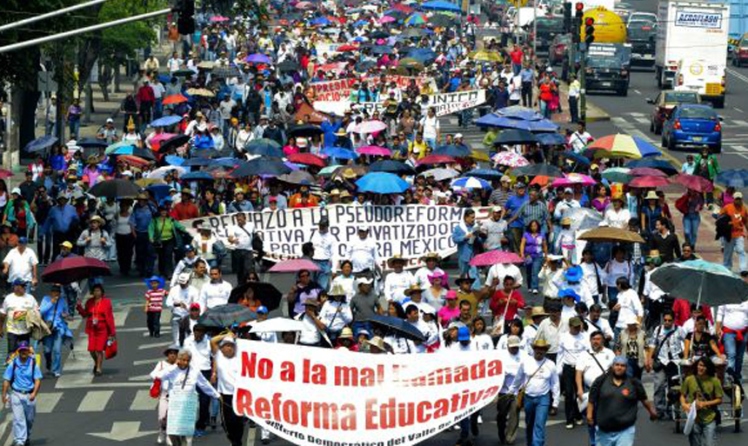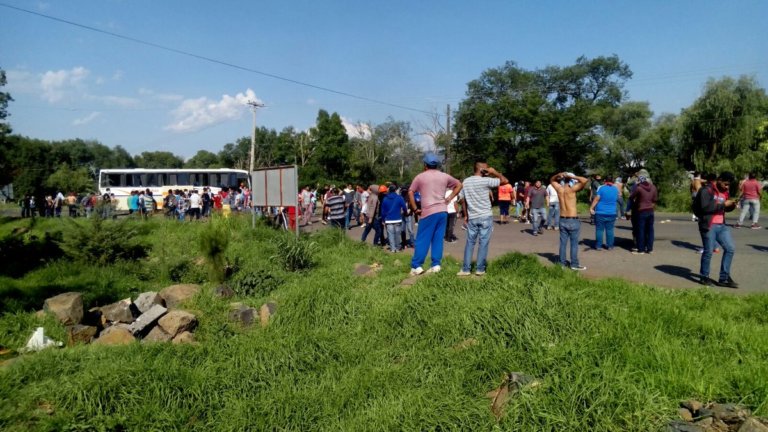x carolina
Last April 19, tens of thousands dissident teachers of the National Coordinating Committee of Education Workers (CNTE) arrived in Mexico City from Oaxaca, Michoacán, Guerrero, Chiapas, San Luis Potosí, Veracruz and Tabasco.
Why did they come? For those willing to listen, their goal is clear: To defend their rights as workers and to defend public education itself.
Since they set up camp in the Zócalo, they’ve held marches and protests, encircled the national House of Representatives and Senate, blocked the highway to the Mexico City Airport, made ‘courtesy calls’ to Televisa and TV Azteca, cordoned off the Public Education Department, carried out a megamarch to Los Pinos (the Mexican White House), joined a multitudinous march against the energy reforms, and despite extreme harassment, encirclement and armed violence by the Mexico City riot police, marched on the federal Congress at San Lázaro on September 1.
That day, President Enrique Peña Nieto should have given his State of the Union Message, but he thought he’d be better off not appearing in public. That day the national Congress consummated an educational fraud against the people of Mexico. That day, despite having received the green light from the national and local Human Rights Commissions, thousands of riot police repressed huge marches of schoolteachers and solidarity groups, committing arbitrary arrests of three independent media communicators and approximately 20 other activists. And now the measures to put an end to public dissidence are being applied in the Mexico City courts through extortion consisting of tremendously high bails and subjection to onerous legal proceedings necessary to try to get cases dismissed.
Since their arrival in the capital city, the schoolteachers have withstood heavy rains, hailstorms, sleepless nights, and threats of a violent Atenco-style dislocation. They’ve faced defamation from the political parties who have imposed the education reform and a fierce campaign in the commercial mass media to discredit their activities and lie about them. They are accused of everything from vandalism to laziness, special privileges, ignorance, violence and rabble-rousing.
Why such a heavy attack against them? Because these schoolteachers are calling into question a strategy that not only means the end of their work as educators, but is also a mortal blow against the education of Mexico’s future generations — a strategy designed by the international business class through the Organization for Economic Cooperation and Develoment (OECD), better known as the “Rich Man’s Club.” A strategy promoted by their national acolytes and signed into a pact by their servants in Mexico’s political class. A strategy that has resulted in massive public school closures in Chicago, Philadelphia and other cities in the United States and has placed education under the control of huge corporations through the development of charter and voucher schools in that country.
Interview
The following interview was done with Marcus Arellanes of Section 22 of the teachers’ union in Oaxaca on September 2, outside the Mexico City Attorney General’s Office, where hundreds of grassroots teachers joined a protest of around a hundred local activists demanding the release of all people arrested on September 1.
— We’re here outside the PGJ-DF talking to a comrade from Section 22.
Yes, my name is Marcus Arellanes of the glorious Section 22 of the state of Oaxaca. We’re here to overturn the so-called education reform, which really has nothing to do with bettering education in the country. It’s an administrative labor reform whose purpose is to dismember the teachers’ union through processes of standardization and control. Authorities plan to evaluate the teachers, but not for the purpose of improving public education.
— You have all been vilified in the commercial news media. Among other things, they accuse you of opposing an evaluation.
We are not opposed to an evaluation, and we don’t oppose professionalization either. On the contrary, we’ve presented a program for transforming education in the state of Oaxaca. We think evaluation is a constant, ongoing process that should be applied to teachers, students, and the schools themselves, but not by failing to respect the contact and the reality of those most affected. We don’t agree with that.
Through this process, the government plans to standardize everything through policies of alignment, control and subjugation. They have approved initiatives and the use of the state power structure to pass laws by using government repression, as we saw yesterday, and that’s why we’re here today to oppose the repression suffered by the comrades who marched in support of the CNTE yesterday. The government has state control, right? The police and the laws are on their side. And they use them to subjugate and control the people. We don’t agree with that.
We know that yesterday they took advantage of the current situation to impose an authoritarian line. But we´re going to confront this disgraceful government that seeks to impose conditions designed in international bodies to privatize, control, take away their responsibility for education and turn it over to the private sector, you see?
— Could you explain how this legislation fosters privatization?
Through changes in Article 73 of the Constitution, they establish something called “social participation,” at the same time the tie between the State and the schools is dissolved so that the urgent needs and requests are ignored. The legislation grants parents the right to look for sources of school financing. Private businesses are already raising their hands to volunteer. We’re talking about BIMBO, Coca Cola, and all the transnational organizations that have just been granted approval to take absolute control of education. From now on, people will have to depend on them. It’s only logical. They’re going to have a big impact on the programs. They’re going to influence the way education is carried out in the schools. And that’s really serious. The authorities are demanding absolute control for businesses in the institutions. What they call “social participation” opens the schools to private business. This can’t be possible, can it?
So we have to wage a real struggle in our classrooms and in our communities to roll this back. It’s an urgent matter. In the long run, the same thing could happen to us that’s happened in Chile, where there are now almost no public schools. Most of them are private. A young person has to study, and to do this, must sell himself to a bank for up to thirty years in order to pay the debt incurred for studying in the university. We can’t accept such a thing. This policy began with Felipe Calderón in the universities, and now they plan to allow a young person to sell his life to a bank through a trust fund. Very very decitful. So we have to put a stop to this for the good of everyone, don’t we?
— What would the privatization of education look like in a state like Oaxaca?
Our state has an enormous linguistic and cultural diversity. That is what’s so valuable. It’s the greatest thing about our state. But it has enormous wealth, too. Natural wealth. Mineral wealth. By controlling people and subjugating them to their education model, companies will be able to take control of all the natural resources. It’s a big deception. The energy reform even fosters the takeover of our territorial space by businesses that come from other countries. Enabling legislations allows for this, so that these companies will be free to propose whoever they want to rule the state, even governors. Just think. A governor from the Silver mining company of Canada controlling the geographic space of an entire region. In the energy reform, that’s what they’re after.
The entire privatizing process has its own orientation of control and subjugation. Oaxaca also has an enormous amount of poverty. Material poverty, because its spiritual wealth is immense. Due to its geography, due to the conditions we live in, a tremendous amount of corruption exists because, it must be said that the state has been victim to corrupt officials and governors for a long time. We’re an oil-rich state, but we don’t have the resources we need, you see? It doesn’t make sense.
We’re in a community of San Carlos Yautepec and we’ve been requesting a classroom for two years. The communities around us have to improvise our classrooms. We don’t have computers. Some don’t even have electricity. But even so, without these materials and in adverse conditions, the Section 22 teachers get their work done using ingenuity and creativity.
— How is it possible to apply a standardized test in this situation?
It can’t be done. It can’t be done. A young person from Monterrey who has the internet and all kinds of resources at his disposal is not in the same conditions as a youth from the Sierra Norte or the Sierra Sur who lives in conditions of marginalization with no job, scarce resources, food shortages and no school building.
We can’t just stand by and do nothing, seeing that our students don’t have the necessary resources to get the education they deserve. That’s why we, after 33 years of struggle, have kept on with the process of mobilization, negotiations and mobilization to wrest the resources from the state that we need for our schools. That’s the way we work.
— It’s often said that the legislation is now an accomplished fact and that there’s nothing that can be done about it. Can that be true?
The day we closed off the airport, the power of the CNTE , the power of Section 22 was clearly shown — our power to convene people, the power of our political discourse. We, as part of the CNTE say that regardless of what happens at the federal level, this reform will not go through in Oaxaca. Why not? Because we’re sure of our force as organized teachers. We’re confident of our capacity to explain the situation, organize and convene people. And how will we achieve this? Through work. Because we’re not afraid to work. We’re not afraid of distances or bad weather. Our position is clear and firm. We’re going to defend what we believe and the principles that sustain the Constitution and social struggles. We will not take one step backwards. The CNTE’s force is strong and we’re going to win out.
— What’s going to happen on Wednesday? There’s talk of mobilizations in 22 states.
That’s right. When something hurts someone and the pain is really strong, that person reacts. He can’t keep on walking with a stone in his shoe. Fortunately, people of conscience, people who are concerned about society and about other people are waking up. During the weeks we’ve been here in Mexico City, we’ve seen this through the support shown by collectives, comrades, social organizations, everyone. And the whole country is awakening. There’s a new consciousness about demanding what we believe to be our right. And we’re going to go out into the streets. Fortunately, teachers in other states, whether in small groups or large, are also waking up. This Wednesday will be a call to action. It will be a vigorous statement about who the government is messing with. We are not playing around. Our decision is firm. And there are more of us all the time.







Published in Spanish at: http://subversiones.org/archivos/12504



